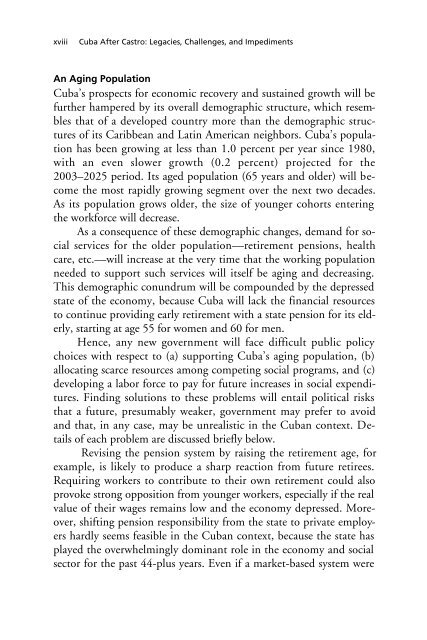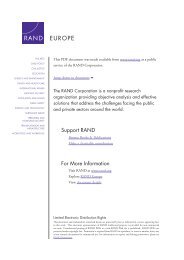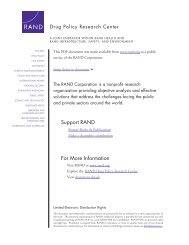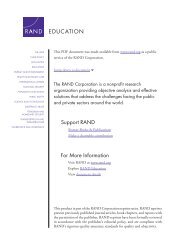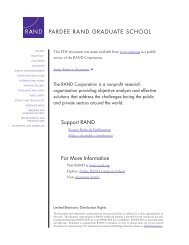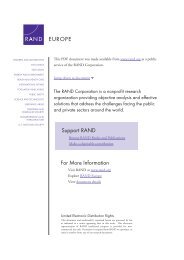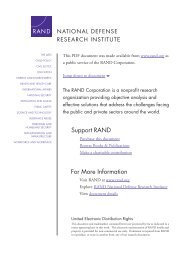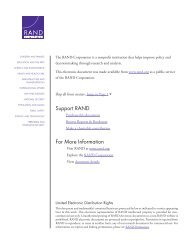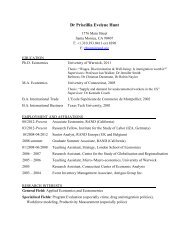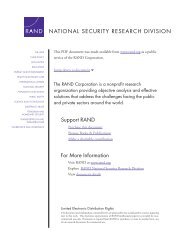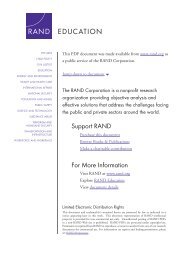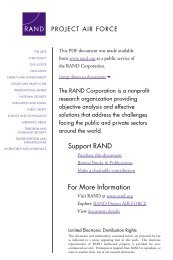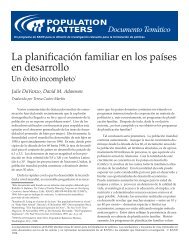Cuba After Castro - RAND Corporation
Cuba After Castro - RAND Corporation
Cuba After Castro - RAND Corporation
You also want an ePaper? Increase the reach of your titles
YUMPU automatically turns print PDFs into web optimized ePapers that Google loves.
xviii <strong>Cuba</strong> <strong>After</strong> <strong>Castro</strong>: Legacies, Challenges, and Impediments<br />
An Aging Population<br />
<strong>Cuba</strong>’s prospects for economic recovery and sustained growth will be<br />
further hampered by its overall demographic structure, which resembles<br />
that of a developed country more than the demographic structures<br />
of its Caribbean and Latin American neighbors. <strong>Cuba</strong>’s population<br />
has been growing at less than 1.0 percent per year since 1980,<br />
with an even slower growth (0.2 percent) projected for the<br />
2003–2025 period. Its aged population (65 years and older) will become<br />
the most rapidly growing segment over the next two decades.<br />
As its population grows older, the size of younger cohorts entering<br />
the workforce will decrease.<br />
As a consequence of these demographic changes, demand for social<br />
services for the older population––retirement pensions, health<br />
care, etc.––will increase at the very time that the working population<br />
needed to support such services will itself be aging and decreasing.<br />
This demographic conundrum will be compounded by the depressed<br />
state of the economy, because <strong>Cuba</strong> will lack the financial resources<br />
to continue providing early retirement with a state pension for its elderly,<br />
starting at age 55 for women and 60 for men.<br />
Hence, any new government will face difficult public policy<br />
choices with respect to (a) supporting <strong>Cuba</strong>’s aging population, (b)<br />
allocating scarce resources among competing social programs, and (c)<br />
developing a labor force to pay for future increases in social expenditures.<br />
Finding solutions to these problems will entail political risks<br />
that a future, presumably weaker, government may prefer to avoid<br />
and that, in any case, may be unrealistic in the <strong>Cuba</strong>n context. Details<br />
of each problem are discussed briefly below.<br />
Revising the pension system by raising the retirement age, for<br />
example, is likely to produce a sharp reaction from future retirees.<br />
Requiring workers to contribute to their own retirement could also<br />
provoke strong opposition from younger workers, especially if the real<br />
value of their wages remains low and the economy depressed. Moreover,<br />
shifting pension responsibility from the state to private employers<br />
hardly seems feasible in the <strong>Cuba</strong>n context, because the state has<br />
played the overwhelmingly dominant role in the economy and social<br />
sector for the past 44-plus years. Even if a market-based system were


